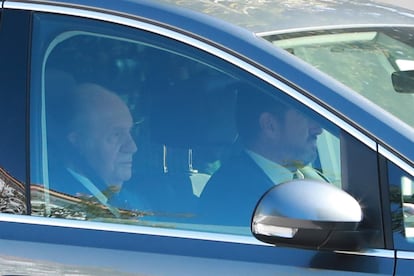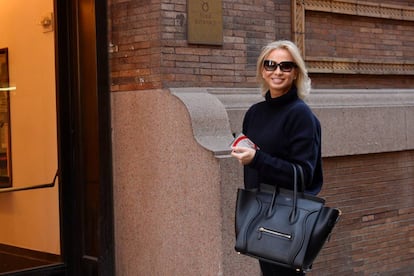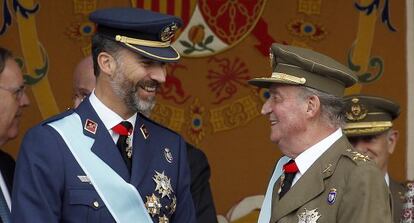Supreme Court prosecutors to investigate Spain’s emeritus king over kickback scheme
The probe will focus on Juan Carlos‘s connection to suspected payments made in exchange for the contract to build the AVE high-speed rail link to Mecca

The Supreme Court public prosecutor announced on Monday that it will investigate Spain’s emeritus king, Juan Carlos I, in connection with suspected kickback payments for the contract to build the AVE high-speed rail link to Mecca.
The probe will focus on the second construction phase of the rail line, which connects the cities of Medina and Mecca in Saudi Arabia. The contract for this stage was awarded to a consortium of Spanish companies, including the construction firm OHL, in 2011.
In a press release issued on Monday, the public prosecutor indicated that the purpose of the investigation will be to “define or dismiss the criminal relevance” of actions that took place after June 2014, when Juan Carlos abdicated the throne and lost his immunity from prosecution as Spain’s head of state.
The team investigating the emeritus king will be led by Juan Ignacio Campos, a prosecutor from the top court and a specialist in financial crimes, who was assigned to the case by Prosecutor General Dolores Delgado on June 5. Three more prosecutors from the Supreme Court have also been assigned to probe “the undeniable technical complexity of these investigative proceedings,” according to the press release.
AVE kickback scheme
Juan Carlos was linked to the payment of possible kickbacks for the AVE contract during a probe into retired police chief José Manuel Villarejo, who is currently in jail awaiting trial over “Operation Tandem,” an investigation into two decades’ worth of shady work he is alleged to have carried out for a long list of wealthy clients.
In 2015, Villarejo met in London with Corinna Larsen, described as a former close friend of the emeritus king. During their conversation, which Villarejo recorded, Larsen spoke of land in Morocco that was under her name, but belonged to the former king. Larsen also said that Juan Carlos had Swiss bank accounts run by trustees. The Monaco-based businesswoman, who continues to use her German ex-husband’s aristocratic title, zu Sayn-Wittgenstein, also made reference to kickbacks the former monarch allegedly received when the AVE contract was awarded to the consortium of 12 Spanish companies.

According to Larsen, as much as €80 million was paid in kickbacks to the wife of a Saudi business magnate, who gave half of this money to a Spanish businessman. This Spaniard allegedly then gave all or part of the amount to Juan Carlos.
These recordings of Larsen were included in a court investigation that was shelved in 2018, after prosecutors concluded that the activities mentioned in the conversation occurred before Juan Carlos’s abdication, when he was still immune from prosecution. However, the judge overseeing the probe, Diego de Egea, sent the information regarding the kickback scheme to the public prosecutor. Months later, the anti-corruption department began investigative proceedings into the case. As part of the probe, prosecutor Luis Pastor interviewed Larsen in London, where she lives.
Swiss investigation
Almost at the same time as the case was being shelved in Spain, Swiss prosecutors opened an investigation into a multi-million-euro donation received by Larsen from a Swiss bank account linked to a Panamanian foundation. Larsen told investigators that the money was a donation from the former Spanish monarch.
In March of this year, Judge Manuel García Castellón, of Spain’s High Court, the Audiencia Nacional, asked Swiss prosecutors for more information on the case. That same month, several newspapers, including EL PAÍS, reported that Juan Carlos had set up two foundations, one of which had transferred the supposed donation to Larsen. In response to the reports, the royal household announced that Juan Carlos had hired Javier Sánchez-Junco, a former anti-corruption prosecutor, as his defense attorney. In a press release, the royal household indicated that Sánchez-Junco would be responsible for publicly responding to all inquiries regarding the former king.

The same press release announced that King Felipe VI had renounced any future inheritance from his father, Juan Carlos I, in connection with alleged financial irregularities involving Swiss bank accounts and multi-million-euro donations. The reigning monarch also stripped his father of his annual stipend of €194,232.
Although the Spanish investigation that was filed in 2018 has not been reopened, today’s announcement represents an important new development. The public prosecutor believes a new investigation “that directly affects the emeritus king” is needed. Juan Carlos’s status as what is known as Spanish as aforado – a kind of immunity to prosecution in lower courts granted to high-ranking politicians or members of the judiciary – means he can only be investigated in the Supreme Court. The investigation will focus on whether the former monarch was involved in criminal activity after his abdication in 2014, when he was no longer immune from prosecution.
English version by Melissa Kitson.
Tu suscripción se está usando en otro dispositivo
¿Quieres añadir otro usuario a tu suscripción?
Si continúas leyendo en este dispositivo, no se podrá leer en el otro.
FlechaTu suscripción se está usando en otro dispositivo y solo puedes acceder a EL PAÍS desde un dispositivo a la vez.
Si quieres compartir tu cuenta, cambia tu suscripción a la modalidad Premium, así podrás añadir otro usuario. Cada uno accederá con su propia cuenta de email, lo que os permitirá personalizar vuestra experiencia en EL PAÍS.
¿Tienes una suscripción de empresa? Accede aquí para contratar más cuentas.
En el caso de no saber quién está usando tu cuenta, te recomendamos cambiar tu contraseña aquí.
Si decides continuar compartiendo tu cuenta, este mensaje se mostrará en tu dispositivo y en el de la otra persona que está usando tu cuenta de forma indefinida, afectando a tu experiencia de lectura. Puedes consultar aquí los términos y condiciones de la suscripción digital.









































